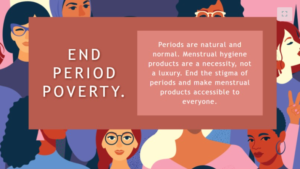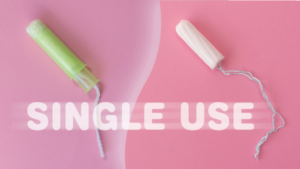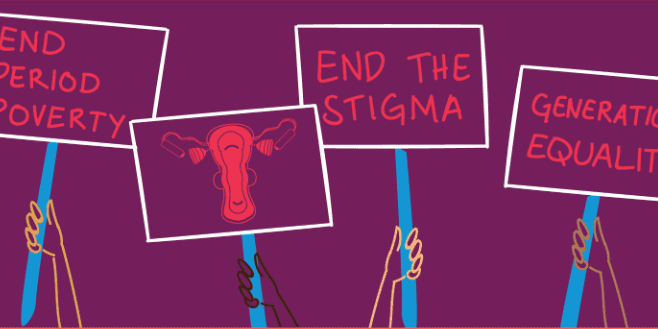Period poverty which is women and girls’ inadequate access to sanitary products and education, is an extension of the widespread poverty existing in Nigeria. With 95.1 million people projected to be living below the poverty line in 2022[1] amid extremely scarce resources, there is little emphasis placed on providing menstrual hygiene and health products for women and girls. More so, due to pre-existing social norms, conversations about periods are often shied away from or avoided. As such, many girls are unaware of what to expect during their first period, know how to track their cycles or even maintain best practices. This has many dire implications.
The lack of information and access to safe sanitary hygiene products forces many particularly in rural areas to resort to alternatives. Over 52 million women and girls in Nigeria experience menstruation, 70% of them without access to sanitary pads.[2] The experiences of women differ by region with more women experiencing period poverty in Northern Nigeria compared to the South. [3] In many cases, women have to supplement with rags, toilet tissues, cotton wool etc., exposing them to infections from repeated or prolonged use of the same sanitary pad or tampon. Lack of access to clean water also exacerbates this situation in many communities causing women to resort to even more unhealthy period practices. Challenges around menstruation also bears consequences in the social lives of women and girls. Many teenage girls experience out of school days and are unable to participate in their communities and homes because of the struggles they experience during their monthly periods. These girls fear stigmatisation or getting stained while in school.

As part of several global initiatives to support menstrual health and hygiene, Scotland has become the first country to provide free sanitary products to anyone in the country who needs them.[4] In Scotland, each council was required to hold community meetings to discover the ideal location for menstruation products. Products were then made available to libraries, swimming pools, public gyms, community facilities, town halls, pharmacies and doctors’ offices. More so, using the smartphone app called PickupMyPeriod, women can now locate the closest place that provides free period supplies. App users can also use the app to filter what items are available and how to find them in the location with the option of home delivery.
For Nigeria, ending period poverty will require more than free access to sanitary products due to the many underlying conditions that surround period poverty. The government needs to reaffirm its commitment to creating a gender-transformative society through policies and legislative frameworks. However, making sanitary products accessible for all could be a step in the positive direction. A sanitary pad costs averagely between 300 ¬ 400 naira in the country. Seeing that a large number of the population live below the poverty line, many are forced to choose between buying pads and food causing them to view pads as a luxury commodity. Thus, measures to make pads available in any form is commendable and important.

Many non-governmental organisations such as Always® Keeping Girls in School Programme has provided close to a million underprivileged school-age girls with crucial menstrual health education and a year’s supply of sanitary pads.[5] However, their impact can only reach a little out of the many and even smaller organisations are hampered by funding limitations
Additionally, in the past, women have been trained by organisations such as UNICEF to make and use washable and reusable cloth pads made from cotton.[6] However, this appears to be a temporary fix as in many communities, there is a lack of access to sufficient and effective WASH facilities. More so, there is still a need for increased knowledge and information on period hygiene to dispel myths and taboos around periods.

Overall, achieving the provision of free sanitary products for women and girls in Nigeria raises the question of whether our ideal endpoint is for menstrual products to just be free or for women and girls to have healthier and safer periods. If it is the latter, it must be reflected in policies and decisions. Policies with a focus only on the provision of free products are likely to be insufficient if they neglect the other underlying issues. Can the provision of products alone mitigate issues of menstrual discomfort and dispel myths and shift social norms? Definitely. Menstrual health deserves attention and making products free in key locations may well be a part of the solution. However, these efforts will fall short if there are no commensurate efforts in other areas.
[1] Word Bank (2022) ‘Nigeria Poverty Assessment’
[2] This Day (2022) Procter & Gamble Partners Federal Ministry of Women Affairs, Nigerian Governor’s Wives Forum, Others on Menstrual Hygiene Day https://www.thisdaylive.com/index.php/2021/06/01/procter-gamble-partners-federal-ministry-of-women-affairs-nigerian-governors-wives-forum-others-on-menstrual-hygiene-day/
[3] The Borgen Project, NGOS In Nigeria Fight Against Period Poverty On World Menstrual Hygiene Day https://borgenproject.org/world-menstrual-hygiene-day-nigeria/
[4] Sullivan, B. (2022) ‘Scotland becomes the first country to offer tampons and pads for free, officials say’ Health,
[5] This Day (2022) Procter & Gamble Partners Federal Ministry of Women Affairs, Nigerian Governor’s Wives Forum, Others on Menstrual Hygiene Day https://www.thisdaylive.com/index.php/2021/06/01/procter-gamble-partners-federal-ministry-of-women-affairs-nigerian-governors-wives-forum-others-on-menstrual-hygiene-day/
[6] UNICEF (2018)No more limits: Girls learn how to make their sanitary pads








